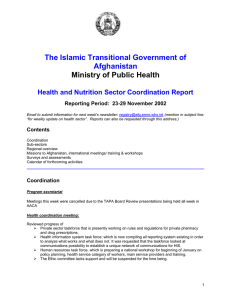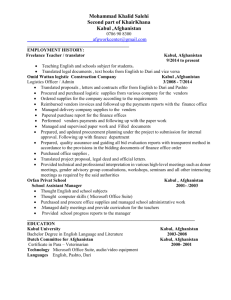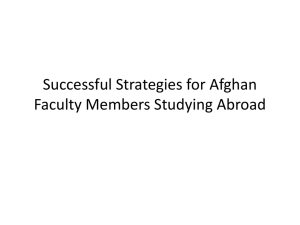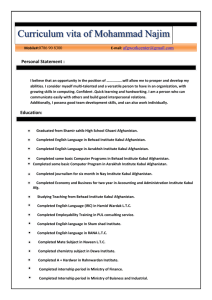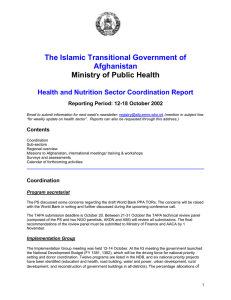The Islamic Transitional Government of Afghanistan Ministry of Public Health
advertisement
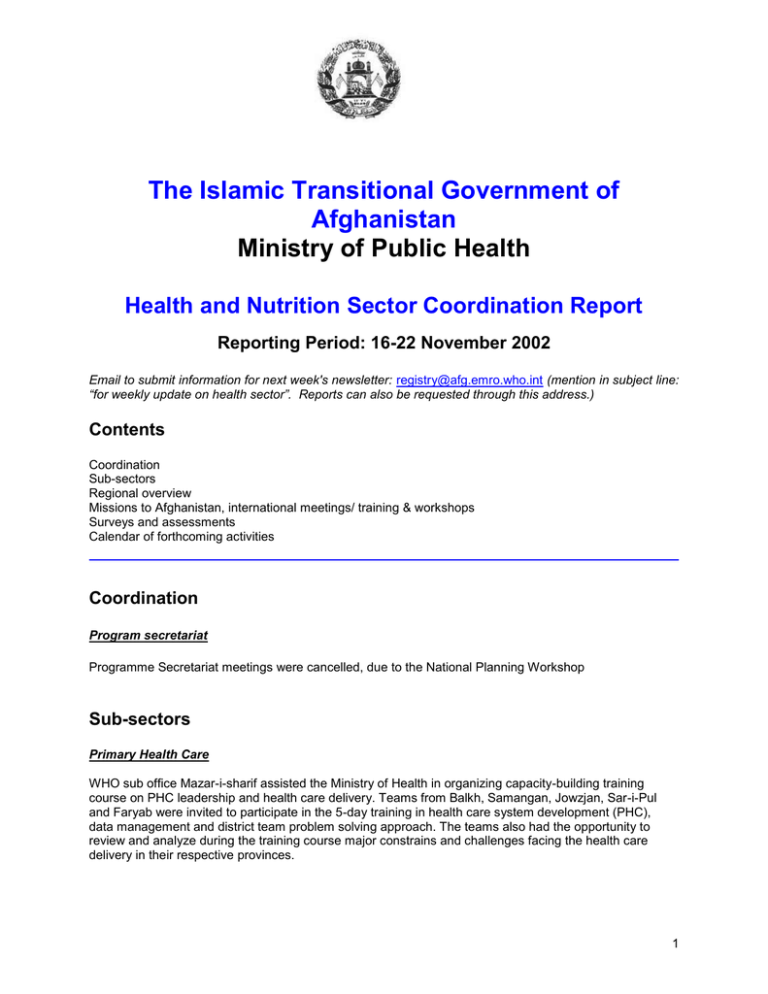
The Islamic Transitional Government of Afghanistan Ministry of Public Health Health and Nutrition Sector Coordination Report Reporting Period: 16-22 November 2002 Email to submit information for next week's newsletter: registry@afg.emro.who.int (mention in subject line: “for weekly update on health sector”. Reports can also be requested through this address.) Contents Coordination Sub-sectors Regional overview Missions to Afghanistan, international meetings/ training & workshops Surveys and assessments Calendar of forthcoming activities Coordination Program secretariat Programme Secretariat meetings were cancelled, due to the National Planning Workshop Sub-sectors Primary Health Care WHO sub office Mazar-i-sharif assisted the Ministry of Health in organizing capacity-building training course on PHC leadership and health care delivery. Teams from Balkh, Samangan, Jowzjan, Sar-i-Pul and Faryab were invited to participate in the 5-day training in health care system development (PHC), data management and district team problem solving approach. The teams also had the opportunity to review and analyze during the training course major constrains and challenges facing the health care delivery in their respective provinces. 1 The PHC teams were trained to train district PHC teams and community health workers to expand the health care services to the poor and most remote communities. The National Planning workshop was held in the Inter-Continental Hotel by the Ministry of Health. Principal objectives of this workshop were: 1. To review the preliminary results of the national facility-based survey with various stakeholders; provincial MOH staff, NGOs, UN agencies, and donors 2. To agree on the process of decentralized health planning in Afghanistan; a bottom-up planning process where provinces will be trained on micro-planning at district level 3. To agree on mechanisms for data sharing and ways to maintain and update the data base. The workshop was jointly sponsored by USAID/MSH, EC, and UNFPA. EPI & Polio Eradication Training activities for the forthcoming NIDs from December 15-17th 2002 have been started all over the country. Master trainers were given refresher courses to improve the quality of NIDs. Micro plans have been revised to incorporate the recent influx of returnees from neighboring countries. Special emphasis has been given to monitor the high risk and difficult areas. Special vaccination campaign for nomads has been started in southern region to cover all moving populations. One new wild virus case has been reported in Nawa-i-Barakzai district of Helmand province. With this new polio case there are now 9 wild virus cases in Afghanistan this year. Surveillance activities have been further enhanced to find any new AFP cases especially in high-risk areas. Mother and Child Health MCH materials and guidelines were dispatched to Mazar and Kunduz including Mother Baby Package Dari version (50 copies), TBA trainers guide (50 copies) and TBA Illustrated manual (100 copies) for use in the training of health care providers as well as in training of TBAS. Also provided the NGOs translated copies (Dari) of Basic Newborn Resuscitation, Mother Baby package, Health Workers manual on counseling in maternal and child health and TBA training materials. Communicable Diseases Outbreak verification and response - system It was agreed during the Health Coordination Task Force held on 12 November 2002, that rumors of outbreaks and outbreak investigation should be discussed first in the weekly meeting of the Epidemic Investigation and Response meeting, which takes place every Wednesday at 14h00 in the Library of the MOH (chaired by the director of the Department of Communicable Diseases). During the weekly communicable disease meeting, progress was evaluated on the control of acute respiratory infections. In 8 major cities of Afghanistan, training sessions on proper case management of acute respiratory infections organized by NGOs and MOH, with support of WHO, have started. In Herat city, Jalalabad, and Kabul, rabies control activities including the immunization of domestic dogs and the destruction of stray dogs have also been started. In Kandahar, the campaign might start soon. 2 Tuberculosis The TB team has started intense preparation for the “National Workshop on Operational Planning for DOTS Expansion at Regional and Provincial level”, that will take place in Kabul from December 11 to 13, with the following objectives: 1) Ensure that all regional and provincial coordinators have clear understanding on technical principles of and practical aspects for DOTS implementation. 2) Develop practical plans at regional and provincial levels for stepwise introduction and expansion of DOTS activities with clear monitoring indicators. 3) Discuss obstacles for DOTS expansion and identify possible solutions. and expected outcomes: a) Regional and provincial TB coordinators who are equipped with clear understanding on DOTS. b) Brief regional and provincial DOTS expansion plans for 2003 with clear targets (such as number of health facilities to be involved). the participants are expected to be Regional and provincial TB coordinators and implementing partners of MoH involved in DOTS expansion, such as local and international NGOs Health Promotion WHO with partner agencies UNICEF and UNFPA provided technical and financial support to MOH in celebration of World Aids Day. Several meeting at the Department of Health Education, promotion and publication of MOH have been held so far to develop the context of brochures on HIV/Aids awareness to general public. 25 000brouchures will be published and distributed on the inauguration of WAD to health professional and general public. Water supply and sanitation On going project of the construction of 100 VIP latrines in Kandahar is in good progress as well as the construction of the water supply system in Kunduz Emergency preparedness and response On going preparation on a national workshop on emergency preparedness and response within the health sector. Unfortunately, the workshop has to be postponed for the first week of February 2003 instead of December 10-12,2002. Overview of Geographic Areas Central Area Preparation of December NIDs 2002 , from 15 to 17 November 2002 with review of villages and district micro-plan, training of trainers, of coordinators, of supervisors and of mass-media staff were organized in the last week in the central area. Northern Area, Kunduz From the 106 patients included in the chloroquine efficacy study, 15 have already completed the 28 days follow-up. Results will be delivered when all patients will have finalized their follow-up. Preparation of the PHC training course in Takhar. 3 Western Area, Herat Training of 25 TBAs from Enjil district. Slight augmentation of the number of ARI cases in IDP camps. Investigation of two-suspected case of AFP. Southern Area, Kandahar 23 doctors from various districts of Helmand province are actually trained in PHC management, that will enable the trained doctors to assess health needs, plan health activities, manage health services and response to epidemics within their districts. Monitoring of training of service provider with special target on the Nomad population, special target for the Nomads OPV campaign that will begin from 24 to 26 November 2002 in the southern area. On 11 November 2002, the MOH in Kabul has been informed by the local community about many patients suffering from hepatitis, typhoid fever, and possibly other diseases in 12 villages around Sia Baghal village, Khas Urozgan district, Uruzgan province. The WHO provincial polio officer, joined later by a team of AHDS (Afghanistan Health Development Services), had found that in Sia Baghal, a village of 5600 inhabitants, 43 clinically suspected cases of acute viral hepatitis were reported from early October up to 20 November. Symptoms reported included: lack of appetite, jaundice, icterus, fever, vomiting, nausea, and right upper quadrant tenderness. Three of the 43 cases had died, and 38 of them were in persons 15 years old or more. Reportedly there would be no functional health facility in the village. Control of spread of hepatitis should be organized by improving access to safe water for the entire population, promotion of personal and food hygiene, and ensuring injection security as well as blood safety. Over all it is estimated that only 13 percent of households in Afghanistan have access to safe water. Reports of outbreaks of hepatitis have been received from various locations in Afghanistan, including Ghazni province (Sae Pay village, Malistan district), and Nangarhar and Logar provinces. No specific treatment is indicated for viral hepatitis, whereas priority should be given to providing access to safe water and injection safety as preventive measures. Southeastern Area, Ghazni An increased of diarrheal diseases was reported from Tasang village of Deh-Yak district of Ghazni. An assessment team left directly to the area under the coordination of MoH-WHO and found 36 patients with the reported problem. Villages were visited and health and hygiene education was given, in the health centers additional drugs were also supplied. SCA community health workers will follow-p the work initiated in term of health education and surveillance of the cases. On 12 November 2002, the district hospital of Jaghuri district, Ghazni province, (supported by Shuhada), has informed the WHO Sub-Office in Ghazni about an outbreak of whooping cough occurring in 12 villages located at about 20 km from the center of the district. The villages are spread over different valleys, and have had no access to routine immunization during the last past 5 years. In the affected villages where an estimated 11000 people live, an investigation team of MOH of Ghazni that visited the area from 15 to 19 November 2002, had found that 80 children had suffered from pertussis, including one death in a 7 months year old child. The diagnosis of pertussis of active and retrospective cases had been on a clinical basis, and all 80 patients were given treatment. It was not reported so far if other people had been offered prophylactic treatment. In order to contain the outbreak among susceptible children in these and in neighboring areas, more medical supplies have been sent by WHO from Ghazni to the Jaghuri district hospital and to the affected villages. The provincial health director of Ghazni has recommended that at least 2 rounds of DPT vaccination should be organized in all of the villages of Jaghuri district that had not yet been covered. 4 Calendar of forthcoming activities November 24-26 southern area: Nomads OPV campaign November 27 at 14h00: Weekly meeting on Epidemic Investigation and Response in MOH, Library. December 4: Health strategy meeting for southern central highlands area, UNAMA compound A. December 11-13, 2002: National Workshop on Operational Planning for DOTS Expansion at Regional and Provincial level in Kabul December 15-17, 2002: Third NIDs Other information: Dr Taher Mustapha, human resources development officer arrived in Kabul for WHO. He will work as support the MoH on HRD for the next 5 months. Dr Basia Tomczyk, IDP officer arrived in Kabul this week and will work on health assessment of IDPs situation in the southern area in collaboration between UNHCR and UNICEF. For more information: WHO Afghanistan Office House No. 249, Street No. 10 Wazir Akbar Khan Mina Kabul, Afghanistan Tel: (0093) 70279010/1-2 Digital lines : 2300181/2 E-mail : registry@afg.emro.who.int Fax No : 0047 233 08112 2207 WHO Afghanistan Support Office P. O. Box No. 1936 House 218, Margalla Road, F-10/3 Islamabad, Pakistan Tel: (92 51) 221 1224, 2104770.4 Fax: (92 51) 228 0830 E-mail: supply@whoafg.org 5
